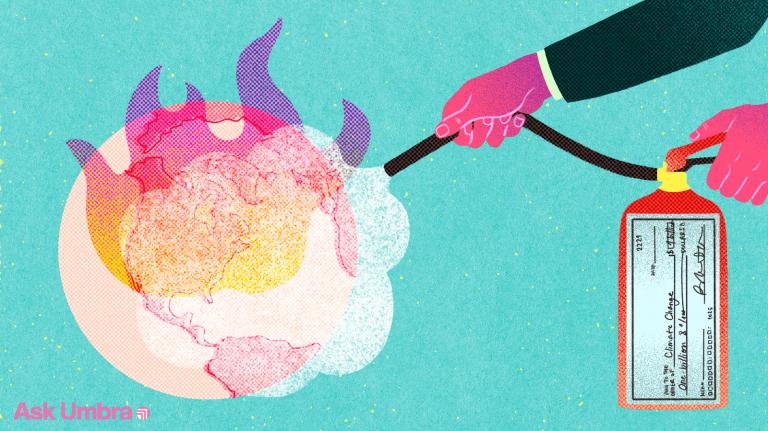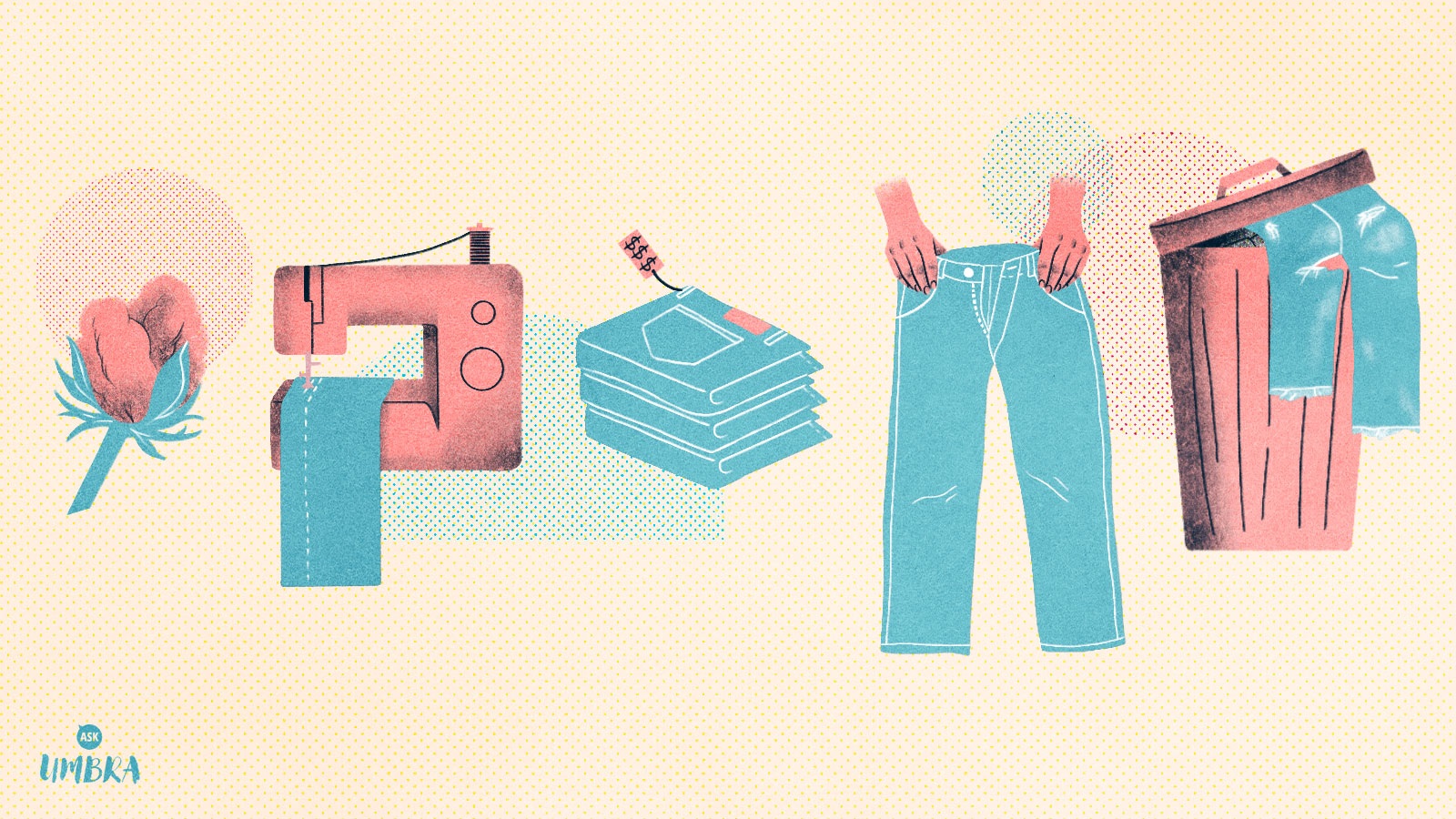Q. Dear Umbra,
Charging consumers the full life-cycle cost, including the cost of disposal, of what they buy seems easy. Would it work?
— Not Only Wise, Also Saves Tons of Emissions
A. Dear NO WASTE,
There’s been a recent surge in the social awareness of waste. Even since the start of the COVID-19 pandemic, many stores are reporting an uptick in interest in sustainability and no/low-waste products. Climate-conscious consumers are channeling their single-use guilt into enthusiasm for brands with limited packaging, recycled jeans, and reusable food wrappers. And, one might reason, what better way of educating shoppers about the environmental impacts of their purchases than having the full life-cycle climate cost reflected in the price tag?
In a way, that idea reflects something called the “polluter pays principle.” It’s a concept that comes up in international climate negotiations to explain why companies from wealthy, industrialized countries should give money to developing nations to help offset the environmental damage inflicted in the process of building said wealth. It’s more or less what it sounds like: Whoever made the mess — be it carbon emissions or chemical runoff or a gazillion microplastics — should pay to clean it up in the end.
But polluting companies aren’t engaging in mischief entirely for their own benefit. If you buy something from one of these polluting entities or use their services in some way, you arguably bear some responsibility for the mess resulting from your purchase’s creation and disposal. But is it really fair to suggest that consumers are just as much to blame for the environmental hazards of the industrial process as the producers? I think not.
Consumer demand isn’t completely inconsequential, nor is it the driving force behind all industry decisions. The reality of modern markets and consumption is far more complex than that. Sure, people want and need to buy things to feed or clothe or otherwise take care of themselves, but businesses also have hidden ways of selling you as many of those things as humanly possible. It’s hardly your fault, for example, that the little recycling symbol means next to nothing. Or that the expensive cell phone you tell yourself you’ll use for the next decade was actually built to fail after three years.
I think you’re suggesting that if consumers had to pay for the full disposal process of all that they buy, they’d buy far fewer unnecessary items. Businesses would then be forced to produce far fewer items, and we’d end up with less waste. I definitely see how this could be advantageous for things like electronics, which produce very expensive and hard-to-deal-with waste, and how it might be a way to curb the whole practice of planned obsolescence. (Note that France recently dealt with this problem by requiring companies to let consumers know how easy certain electronic products are to repair, instead of making those products more expensive.)
However, in practice, there are many disadvantages to this full carbon footprint strategy of pricing. In fact, it raises a lot of the same issues of the old “individual climate responsibility” versus “systemic change” debate (that old chestnut!). Even if large companies and governments — the ones with the real power to institute systemic change — have made terrible decisions in the past with regard to climate change, what good is it for individuals to pay the price? Of course, individuals have benefited from those government or corporate decisions because we pay an artificially low price for things like food, clothing, and energy.
There are reasons that “sustainably made” jeans cost $200. Perhaps the denim is made from regeneratively farmed cotton in a fair-wage factory that uses nontoxic dyes and offsets its water usage. It takes a lot of money to clean up your manufacturing process and compensate your employees well! But the reality is that not every consumer can afford to make the most climate-friendly purchase. Adding on the eventual cost of recycling that fabric or offsetting the carbon emissions the cotton will release in a landfill just feels excessive!
If we propose that everyone pay the real cost — one that takes into account all the pollution that any single item produces — of everything they consume, we might be forgetting that there are many millions of Americans who can barely afford even those falsely cheap necessities. The idea of adding the cost of disposal to the price of any item is basically instituting a sort of sales tax, and as we already know, that’s a highly regressive form of tax because it disproportionately burdens people with lower incomes.
Why? Because everyone needs to buy basic things like food and clothing, but they make up a far larger proportion of a poor household’s spending than a wealthy one’s. It just doesn’t seem right that someone who makes $20,000 a year pays the same amount of tax on a cell phone as someone who makes $200,000 a year. By the same token, it’s not really fair for that person making $20,000 to suddenly have to pay, say, 30 percent more for that cell phone, even if that reflects the true cost of its disposal.
In my opinion, the easiest solution to the myriad “who’s picking up this check?” type problems associated with environmental and climate responsibility is to let governments take care of it, rather than foisting additional burdens onto households. And here’s the thing: You do already help pay for the government to dispose of your waste — in the form of taxes, garbage bills, and in some municipalities, like Seattle, a whole extra utility charge.
Granted, there is at least one intriguing international example of the “polluter pays” doctrine. Switzerland is considered to be something of a marvel in terms of how much of its waste is recycled. That’s often attributed to the fact that both businesses and individuals are considered “polluters” and charged for the disposal of waste. For example, trash bags are heavily taxed, giving Swiss consumers an incentive to alter their consumption habits to produce less trash. They even have actual trash police to enforce proper recycling practices!
But we’re back to the equity issue. Switzerland is one of the wealthiest countries in the world, and more importantly, it has a heftier social welfare system than the United States. If by some political miracle you were able to pass the sort of planet-focused pricing system you suggest and suddenly everything you could possibly buy was significantly more expensive than it was yesterday, there would be riots in the streets! Have you ever seen the strength of opposition to a ballot initiative that would result in a 0.1 percent tax increase?
In the end, making things more expensive is never, ever going to be the best way to get people on board with more environmentally sound practices. Any really sustainable climate future is going to have to be built on more constructive policies than punitive ones.
Analytically,
Umbra



